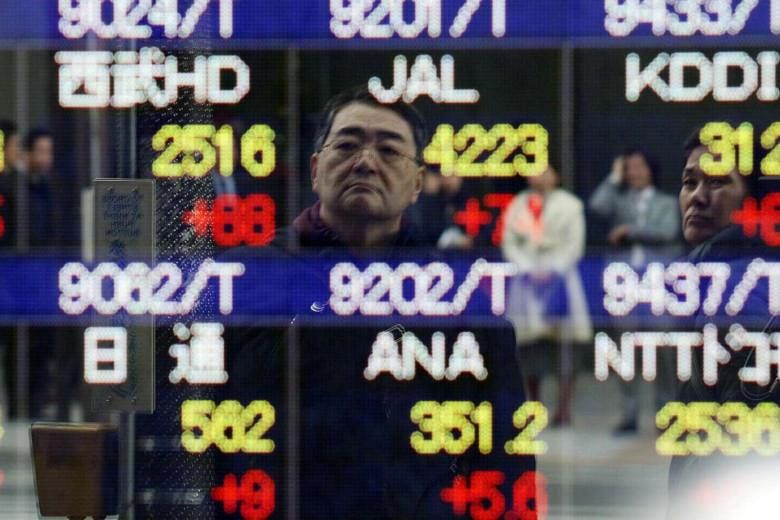WELLINGTON/SINGAPORE (BLOOMBERG) - Asian stocks resumed losses as the bout of optimism that followed the first US interest-rate hike since 2006 faded, replaced with anxiety over commodities and the widening divergence in global monetary policy. Oil slumped, while the US dollar solidified its gains.
The Asian equity benchmark snapped a two-day climb, with commodity producers driving declines to trim the gauge's first weekly gain in a month. Copper rallied after the dollar's ascent hit metals, while US crude fell a third day, plumbing the depths below US$35 a barrel. Currencies in Asian emerging markets caught up with the losses from Thursday.
The MSCI Asia Pacific Index lost 0.5 per cent as of 10:10 am Tokyo time, paring its advance in the week to 0.3 per cent. Japan's Topix index also fell 0.5 per cent after driving gains in the region Thursday, with oil and coal producers among its biggest decliners.
Singapore's Straits Times Index was down 0.5 per cent at 2,846.85 as at 10:07 am.
Australia's S&P/ASX 200 Index lost 0.7 per cent, pulling back from an earlier slump of as much as 1.5 per cent, with miners and oil producers declining. The Kospi index lost 0.6 per cent in Seoul. In Hong Kong, futures on the Hang Seng Index dropped 0.1 per cent in most recent trading, while those on the FTSE China A50 Index were down 0.7 per cent.
Central banks around the world are reacting to the Federal Reserve's policy tightening, with the Bank of Japan expected to hold fast to record stimulus on Friday, after Mexico hiked rates and Taiwan cut. Investors have started to digest the implications of a stronger dollar in the wake of the rate increase, selling off raw materials amid concern junk-rated resource producers won't be able to stay solvent. Gold slumped the most since March and crude oil fell back to an almost seven-year low Thursday as the lure of higher yields drove the greenback to its highest level since at least 2005 versus major peers.
"The dollar's strength is going to dictate the mood of investors globally," said Scott Schuberg, chief executive officer of Rivkin Securities Ltd. in Sydney. "We need to see the dollar trend lower in order for investors to get excited again about emerging-market growth and so that commodity prices could come back and breathe life into inflation."
The BOJ is expected to maintain its bond purchase program as is on Friday, according to all buy one of the 42 economists surveyed by Bloomberg. Policy makers will likely discuss the Fed's decision to hike as well as the slump in oil prices. China also reports on property prices.
The Bloomberg Dollar Spot Index, a gauge of the greenback versus 10 major counterparts, was near its highest level in at least a decade following Thursday's 0.8 per cent climb. The index is on track for its best week since the start of November after the long-awaited rate rise from the Fed burnished the currency's appeal.
New Zealand's dollar extended losses into a second day as other commodity-linked currencies including Australia's and the Canadian dollar maintained last session's declines.
The Korean won led the retreat in Asia, falling 0.4 per cent in a second day of declines as the Thai baht fell 0.3 per cent. The continuing slump in oil weighed on Malaysia's ringgit, with the country Asia's only major net oil exporter. It depreciated 0.2 per cent, bringing its second straight weekly drop to 0.6 per cent.
Australian and New Zealand government debt due in a decade fell by at least six basis points as rates on similar maturity Treasuries dropped another basis point to 2.22 per cent, extending Thursday's seven basis-point decline.
Japanese 10-year yields were little changed at 0.30 per cent before the BOJ review.
Bonds benefit from cheaper raw-material prices because they curb inflation and preserve the value of the fixed payments on debt. Longer-term securities are more sensitive to the inflation outlook than monetary policy, helping them to outperform. Thirty-year Treasury yields fell by one basis point to 2.92 per cent after losing eight basis points last session.
West Texas Intermediate crude slipped 0.6 per cent to US$34.73 a barrel, after closing at its lowest settlement since February 2009. Brent was also down, dropping 0.5 per cent in a third day of losses, to US$36.87.
Angst over a global glut has weighed on oil all year, with OPEC's decision earlier this month to effectively abandon production limits sparking a deeper selloff. US crude stockpiles climbed to the highest level for this time of year since 1930, the Energy Information Administration reported this week, while Goldman Sachs warned of "high risks" that oil may fall even lower as supplies swell.
The Fed's rate hike has bolstered the US dollar, diminishing the appeal of raw materials denominated in the U.S. currency. The Bloomberg Commodity Index slipped 0.6 per cent last session in a sixth day of losses, falling back to its lowest level since 1999.
Copper rallied 0.3 per cent to US$4,560 a metric ton in London after sinking 1.4 per cent Thursday, while gold for immediate delivery added 0.2 per cent to US$1,052.86 an ounce, paring back some of last session's 2 per cent slump. The precious metal has lost 2 percent this week, on track for its worst performance since the start of November.

